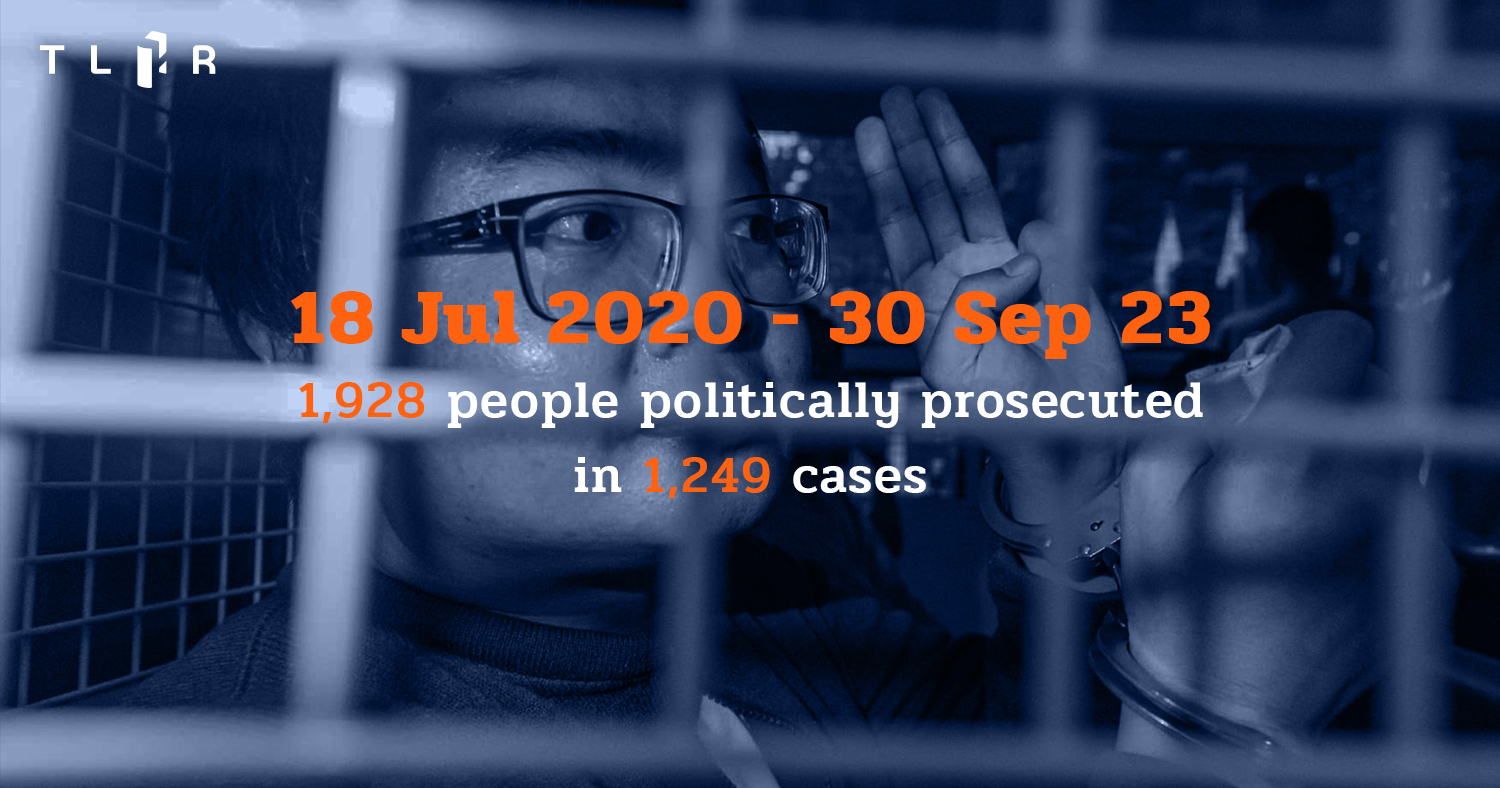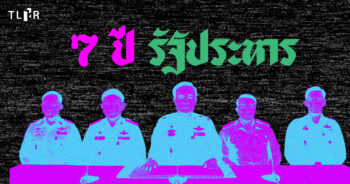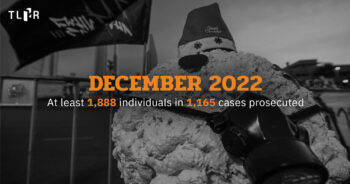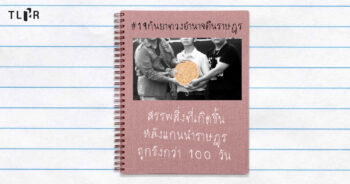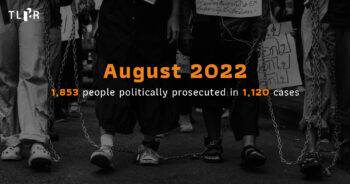(Data as of 3 October 2023.)
In September, we witnessed an increase in the number of people detained in lèse-majesté cases due to their political expression, even though their cases have not concluded. In the course of one month, the Court of First Instance has passed verdicts in 4 cases and the Court of Appeals in 2 cases, while 3 defendants have been denied bails. Meanwhile, 5 new cases associated with political assemblies and one new case under the Computer Crimes Act have been initiated, all of which were based on activities and events occurring during General Prayut Chan-o-cha’s government. It is thus crucial to carry on monitoring how the laws related to assemblies and expression will be enforced by the new government.
According to TLHR statistics, at least 1,928 people have been prosecuted in 1,249 cases due to their participation in political assemblies and expressions since the beginning of the “Free Youth” protest on 18 July 2020 until 30 September 2023.
Among this number are 216 cases involving 286 children and youths under 18 years old.
Compared to August 2023, 3 more people have been prosecuted (only counting those never been charged before) and 8 new cases have been initiated.
If we also count and include those who are charged repeatedly in multiple cases, we have found that there would be at least 3,922 instances of prosecution in total.
The prosecution can be grouped according to key charges used, as follows:
1. The royal defamation or “lèse-majesté” charge under Section 112 of the Criminal Code: at least 258 individuals in 280 cases.
2. The “sedition” charge under Section 116 of the Criminal Code: at least 130 individuals in 41 cases.
3. Charges of violation of the Emergency Decree: at least 1,469 people in 663 cases (since May 2020 when the first lawsuit against protesters and political activists was filed)
4. Charges under the Public Assembly Act: at least 177 people in 88 cases.
5. Charges under the Computer Crimes Act: at least 186 people in 205 cases.
6. Contempt of court charge: at least 36 people in 20 cases and insult of court charge involving at least 34 people in 10 cases.
Out of the mentioned 1,249 cases, 429 have concluded. Meaning, over 820 cases are still ongoing at various stages.

The following key events have been observed as part of the prosecution trend in September 2023:
The Appeals/Supreme Court issued orders denying bails for defendants in lèse-majesté cases in Bangkok following the verdicts by the Court of First Instance. The number of people detained during trial rose to 10.
As far as we know, at least 1 more person has been charged with lèse-majesté in 2 cases. In one case, Sophon “Get” and “Baipor” have been summoned by Lumphini Police Station for participating in the anti-APEC demonstration at Asoke Intersection in November 2022. They have not reported themselves and heard the charges yet. Likewise, in the other case, we have learned that an ordinary citizen has been accused at Pak Kret Police Station and is in the process of waiting to acknowledge the charges as well.
As for the lèse-majesté cases in courts, in the past month, the Court of First Instance issued verdicts for at least 4 cases — 3 where the defendants decided to defend themselves in trials and 1 where he/she confessed and entered a guilty plea.
In the 3 trials that took place, the courts found defendants guilty in all cases. This includes the case against Pimchanok Jaihong, who was sentenced by Chiang Mai Provincial Court to a 2-year prison term, but was granted bail during appeal. Two other cases were tried by the Criminal Court, including that against Arnon Nampa and Weerapap Wongsaman, who were sentenced to a 4-year and 3-year prison term, respectively. Both had submitted bail requests to the Appeals Court, which then rejected them.
The case where the defendant confessed was that of Teerawat, who was given a suspended sentence by the Samut Prakan Provincial Court.

Based on the pattern of the lèse-majesté case outcomes under the Criminal Court in the past 4 months, we have found that if the Court of First Instance issued a prison sentence without suspension, no matter whether the defendants pleaded guilty or not guilty, or how severe the penalty was, the Court would forward the defendants’ bail application to the Appeals Court or Supreme Court for consideration. Then, all of the applications would be rejected by the higher court. The courts usually cited similar reasons that the defendants might flee given the decisions of the Court of First Instance, even though almost all defendants had duly attended the court appointments and never showed a tendency to flee.
Moreover, according to the Regulation of the President of the Supreme Court on Temporary Release and Collection of Security in a Criminal Proceeding B.E. 2565 (2022), if the court passes a sentence of imprisonment for a term not exceeding five years and the defendant has never been previously imprisoned and has not showed a tendency to flee, the court is allowed to deliberate on a bail request by itself. Instead, the Criminal Court decided to pass on all bail requests to the Appeals Court.
Meanwhile, the Courts of First Instance other than the Bangkok Criminal Court considered the bail requests themselves, despite having delivered prison sentences.
Last month, 2 other lèse-majesté cases have received verdicts from the Appeals Court, namely, the cases against Sombat Thongyoi and Meechai. In both cases, the Appeals Court decided to affirm prison sentences by the Court of First Instance. While Sombat’s sentence has been reduced to 4 years, Meechai’s sentence of imprisonment remains unchanged with a term of 2 years and 8 months.
Nevertheless, the bail situation in these two cases differed. In Sombat’s case, the Bangkok South Criminal Court forwarded the bail request to the Supreme Court for consideration, which was later rejected. In Meechai’s case, the Samut Prakan Provincial Court issued the order granting bail for Meechai during appeal directly.

Thus, up until the end of September, there were at least 10 people in lèse-majesté cases who ended up behind bars during trial, including Wut (during trial by the Court of First Instance), Wayha – Teepakorn – Warunee – Wat – Sophon – Anon – Weerapap (during appeal), and Udom – Sombat (during appeal to the Supreme Court).
The abovementioned trend raises concerns regarding court judgments and bail decisions in the upcoming months.
Most new cases contain charges under the Public Assembly Act, while those in the Emergency Decree cases are still battling court trials.
In September, 5 new cases related to political assemblies have been initiated. Among them are 4 containing key charges under the Public Assembly Act, including the case based on the protest calling for the removal of Naowarat Pongpaiboon from the Senate in front of the Ministry of Culture on 6 August 2023, the case based on the motorcycle-riding activity to call for the release of political detainees near the Temple of the Emerald Buddha, and the cases based on the wearing of prisoner uniform as a symbolic expression at Siam Paragon, Siam Square, and in front of the Police Hospital.
In addition, the police from Lumphini Police Station issued summonses to 4 activists for failing to notify public assemblies to officers and other misdemeanors in the context of the “WHAT HAPPENED IN THAILAND” march from Asoke Intersection to the APEC2022 Summit to submit letters to the world leaders on 17 November 2022. The cases were brought almost 10 months after the event.
Another case concerned an unauthorized use of fireworks during a demonstration in front of Pheu Thai Party headquarter.

One new case under the Computer Crimes Act also emerged with the accused, “Wijit”, having been arrested by the police last month. The case was based on a post published after the NCPO-led coup in 2014-2015. Wijit, a construction contractor in Khon Kaen, was arrested by the virtue of the warrant issued by the Criminal Court and transferred to the TCSD for publishing 10 posts containing political criticism. It was found that the arrest warrant had been issued since 2018; however, Wijit had neither received the warrant nor been aware of the charge against him until his arrest. He has been granted bail during the inquiry stage.
As far as the Emergency Decree cases related to the 2020-2022 mass protests are concerned, it was found that last month the courts have passed verdicts in 9 cases. In 4 cases, the courts acquitted the defendants seeing that the alleged activities were still considered peaceful assemblies without arms according to the Constitution and containing low risk of disease transmission.
In the other 5 cases, the defendants were convicted. Most defendants received the penalty of fine, except one whose punishment was waiting to be determined. The courts generally established that the assemblies lacked proper preventive measures against Covid-19 thus leading to transmission risk.

Furthermore, 2 cases have received verdicts by the Appeals Court. In Yala Car Mob case, the Appeals Court Region 9 affirmed the lower court’s verdict that the defendants were guilty of violating the Emergency Decree and the suspended 2-month prison sentence. In the case against “Poom”, a youth who participated in the 13 October 2023 protest, the Appeals Court modified the sentence to a suspended 2-year prison sentence, after the Court of First Instance handed down a prison sentence and replaced it with an order requiring attendance in a training at the Children and Youth Training Center for 6 months.
September also saw the verdicts of the contempt of court cases against “Manee” and “Jinny’ following their guilty pleas. The Bangkok South Criminal Court sentenced the two to a prison term of 6 months without suspension, seeing that their conduct concerned a serious matter and affected the people’s confidence in the court of justice. That said, the court allowed bail for both of them during appeal.
